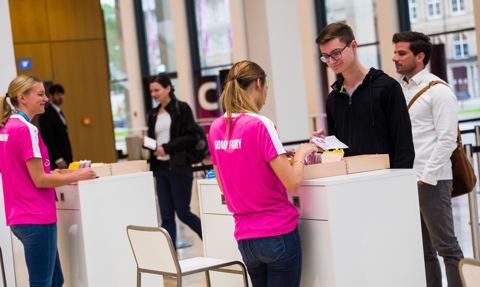How to build an event planning dream team


Anyone with experience working in the events industry will know its continuous, hectic nature. The constant rush, tight deadlines and budgets, and changes to original plans are daily obstacles faced by the event planning dream team. Needless to say, event planning is a complex task and can’t be trusted by just one person. Therefore, it’s important for organizers to divide the workload across an efficiently put-together and well-coordinated event-planning dream team.
To build an event planning dream team is just the first step towards delivering a successful event. Even the dream team is organized with a purpose, whether for a conference, festival, or musical event. The first step is to recognize which team members are required.
Building an event planning dream team between many other duties demands mapping out and delegating tasks to responsible owners. An event planner leads the entire event planning team in executing a flawless event and is responsible for every task assigned to the team members. This is the point where communication becomes critical.
You can’t expect tasks to be executed without being clear about the tasks and the deadlines. Communication is crucial for smooth execution, but it can also be a motivating factor. A motivated event dream team does its best to deliver successful events. Motivated team members will do everything they can to execute their tasks in the best possible way.
It is important to build an event planning team that can grow and evolve from one project to another. It is sufficient to say event team professionalism dramatically contributes to the attendees' overall experience. If well assembled, your event planning team should be:
Problem-solving
Stress-free
Always learning and improving
Making your events unique
To help build an event planning dream team, you may consider forming a special event committee responsible for task execution. The most common roles in managing your event could include:
Team lead
Content owner
Creative committee
Operations
Finance or budgeting
Whether you operate a small or a big team, you can always use the power of digital tools to maintain seamless event organization. Event management platforms such as run.events have online workflow management features that can be used with all stakeholders (i.e., attendees, sponsors, exhibitors, and service providers), delivering key benefits to each group.
Team members have continued access to each other in case of any major changes (e.g., postponement, cancellation, or other updates) or detail about ongoing event procedures (i.e., call for speakers, sponsorship, lead generation, gamification, or giveaways).
It takes time to assemble the right event planning team; a trial-and-error approach is crucial for success. The pursuit of excellence comes with occasional slip-ups, so don’t be disappointed if things aren’t always running well. Here are some guidelines on what to look for in each team role.
Team lead
As the team coordinator, the team lead should have a basic sense of the goals and structure of the event. They should start with the vision, understand the event budget, stakeholders and overall topics, and transfer that knowledge to the team.
Content owners
Content owners are responsible for many activities, from the Call for Papers to catering and accommodation. This is arguably one of the most important roles with a wide range of duties:
Selecting a venue
Selecting speakers and topic
Detailing program activities
Scheduling entertainment
Selecting caterers
Doing venue walkthroughs
Estimating attendee numbers
Creative committee
The creative committee usually contributes to media, marketing, and attendee engagement and to building brand identity:
Building event media pool
Audience and media engagement
Creating various event layouts and maps
Website and event app management
Developing branding, theme and key visuals
Operations
The operations team is responsible for every aspect of the events they manage. The following duties are typical:
On-site registrations
Technical elements
Agenda management
Service partner management
Guest assistance
The committee structure and the duties of each team may vary from event to event, depending on size, budget and the specific industry branch at which the event is aimed. However, task delegation is crucial as it provides better decision-making, streamlining, and creativity.
Organizing events goes much more smoothly when the event planning team is built according to the needs of the project. As an event planner, you must form a team that works together proactively. Remember, event planning isn’t a one-size-fits-all approach, and a bigger team isn’t always better.